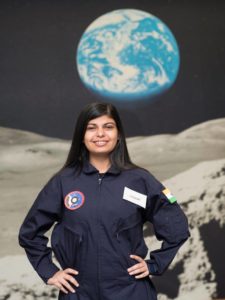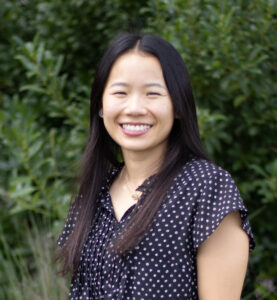
Poonam Josan is a PhD student in Texas A&M’s Aerospace Engineering department. Her interests focus on space human factors, in particular human-system integration (HSI) and human performance optimization in altered gravity environments. She is also interested in understanding human and robotic interactions and using Earth-based analogs to develop related operational frameworks for integrated human-robotic planetary exploration.
Poonam received a B.Tech. in Aerospace Engineering from SRM University, India where her research focus was on improving thrust efficiency of micro-propulsion devices using aerospike nozzles. To pursue her interest in human spaceflight, she moved to the US and received a MS in Space Studies from University of North Dakota (UND). While there, she was heavily involved in student rocketry, high altitude ballooning, planetary space suits and human habitation related analog research (both as a subject and mission controller). She also served as President of UND’s Dakota Space Society which engaged the general public in STEAM related activities. Upon graduation, Poonam worked for start-ups in the Southern California aerospace industry before eventually deciding to return to academia. Her current research work at BHP utilizes NASA’s HSI standards for the experimental design and Human-in-the-Loop (HITL) testing of a Virtual Assistant (VA) tool developed for future long duration exploration missions.
Apart from space exploration, Poonam enjoys traveling, exploring national parks, hiking, and learning about modern history.
Renée Abbott
 Renée Abbott is a Ph.D. student in Texas A&M’s Aerospace Engineering department. She is a 2021 NASA NSTGRO recipient, and her research will include developing and assessing the effectiveness of virtual reality technologies as tools to enhance the behavioral health of astronauts on long duration missions. Her additional work is focused on assessing physiological function in altered gravity environments via parabolic flight and short-radius centrifuge analogs. In 2020, Renée received her B.S. in Aerospace Engineering with minors in mathematics and astrophysics from Texas A&M. She has also been a member of the A&M Gymnastics club since 2017 and served as the Women’s Team Captain from 2020-2021.
Renée Abbott is a Ph.D. student in Texas A&M’s Aerospace Engineering department. She is a 2021 NASA NSTGRO recipient, and her research will include developing and assessing the effectiveness of virtual reality technologies as tools to enhance the behavioral health of astronauts on long duration missions. Her additional work is focused on assessing physiological function in altered gravity environments via parabolic flight and short-radius centrifuge analogs. In 2020, Renée received her B.S. in Aerospace Engineering with minors in mathematics and astrophysics from Texas A&M. She has also been a member of the A&M Gymnastics club since 2017 and served as the Women’s Team Captain from 2020-2021.
Rashika Rao
Rashika Rao is a doctoral student and Engineering Graduate Merit Fellow in Texas A&M’s Aerospace Engineering department. Her research interests include using analogue environments to investigate human health and performance in short- and long-duration spaceflight. She is currently working on investigating the effects of gravitational transitions on bimanual coordination task performance.
Rashika received her B.S.E. and M.Eng in Space Engineering from the University of Michigan. After graduating, she worked as a research coordinator in the University of Florida’s Neuromotor Behavior Lab, where she studied the effects of microgravity and varying gas conditions on the human glymphatic system. Outside of the lab, Rashika enjoys tennis, singing, and learning the electric bass. She is passionate about science outreach, and hopes to build on her undergraduate efforts in grad school.
Madison Herrmann
 Madi Herrmann is a Ph.D. student in the Aerospace Engineering department. Her research interests focus on performance optimization for spaceflight, particularly investigating physiological and cognitive impacts for extravehicular activity (EVA). Madi is a Texas A&M College of Engineering Horizons fellowship recipient.
Madi Herrmann is a Ph.D. student in the Aerospace Engineering department. Her research interests focus on performance optimization for spaceflight, particularly investigating physiological and cognitive impacts for extravehicular activity (EVA). Madi is a Texas A&M College of Engineering Horizons fellowship recipient.
Originally from Columbus, OH, Madi received her B.S. in Aerospace Engineering from The Ohio State University. At OSU, Madi served as a project manager within the competitive rocketry team, the Buckeye Space Launch Initiative, and was heavily involved in student organizations aiming to engage students of all backgrounds in space exploration efforts. Outside of the BHP lab, Madi enjoys running, scuba diving, hiking, and any outdoor adventures.
Cort Reinarz
 Cort Reinarz is a Ph.D. student in Texas A&M’s Aerospace Engineering department. His research interests involve investigating human health countermeasures in altered gravity environments through modeling and experimentation.
Cort Reinarz is a Ph.D. student in Texas A&M’s Aerospace Engineering department. His research interests involve investigating human health countermeasures in altered gravity environments through modeling and experimentation.
Cort received his B.S. in Aerospace Engineering at Texas A&M University. While there, he was a recipient of the Aerospace Engineering Department’s Distinguished Student Award as well as the Brad Worsham ’88 Scholarship. Outside of the classroom, he was a member of the Texas A&M Bowling Team as well as a volunteer tutor. He was also a member of both the Sigma Gamma Tau and Tau Beta Pi Honors Societies.
